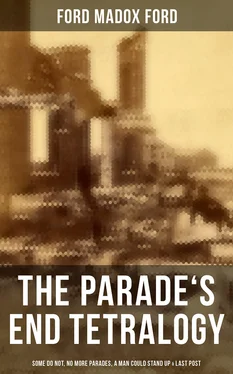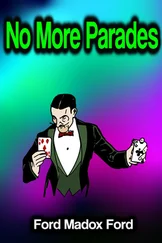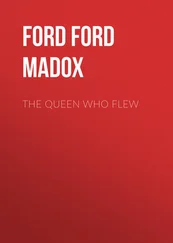‘You couldn’t,’ Tietjens said. ‘You couldn’t see the cart.’
They had just run into a bank of solid fog that seemed to encounter them with a soft, ubiquitous blow. It was blinding; it was deadening to sounds; it was in a sense mournful; but it was happy, too, in its romantic unusualness. They couldn’t see the gleam of the lamps; they could hardly hear the step of the horse; the horse had fallen at once to a walk. They agreed that neither of them could be responsible for losing the way; in the circumstances that was impossible. Fortunately the horse would take them somewhere; it had belonged to a local higgler: a man that used the roads buying poultry for re-sale . . . They agreed that they had no responsibilities; and after that went on for unmeasured hours in silence; the mist growing, but very, very gradually, more luminous . . . Once or twice, at a rise in the road, they saw again the stars and the moon, but mistily. On the fourth occasion they had emerged into the silver lake; like mermen rising to the surface of a tropical sea . . .
Tietjens had said:
‘You’d better get down and take the lamp. See if you can find a milestone; I’d get down myself, but you might not be able to hold the horse . . . ’ She had plunged in . . .
And he had sat, feeling, he didn’t know why, like a Guy Fawkes; up in the light, thinking by no means disagreeable thoughts—intent, like Miss Wannop herself, on a complete holiday of forty-eight hours; till Tuesday morning! He had to look forward to a long and luxurious day of figures; a rest after dinner; half a night more of figures; a Monday devoted to a horse-deal in the market-town where he happened to know the horse-dealer. The horse-dealer, indeed, was known to every hunting man in England! A luxurious, long argument in the atmosphere of stable-hartshorn and slow wranglings couched in ostler’s epigrams. You couldn’t have a better day; the beer in the pub probably good, too. Or if not that, the claret . . . The claret in south-country inns was often quite good; there was no sale for it so it got well kept . . .
On Tuesday it would close in again, beginning with the meeting of his wife’s maid at Dover . . .
He was to have, above all, a holiday from himself and to take it like other men, free of his conventions, his strait waistcoatings . . .
The girl said:
‘I’m coming up now! I’ve found out something . . . ’ He watched intently the place where she must appear; it would give him pointers about the impenetrability of mist to the eye.
Her otter-skin cap had beads of dew; beads of dew were on her hair beneath: she scrambled up, a little awkwardly: her eyes sparkled with fun: panting a little: her cheeks bright. Her hair was darkened by the wetness of the mist, but she appeared golden in the sudden moonlight.
Before she was quite up, Tietjens almost kissed her. Almost. An all but irresistible impulse! He exclaimed:
‘Steady, the Buffs!’ in his surprise.
She said:
‘Well, you might as well have given me a hand. I found,’ she went on, ‘a stone that had I.R.D.C. on it, and there the lamp went out. We’re not on the marsh because we are between quick hedges. That’s all I have found . . . But I’ve worked out what makes me so tart with you . . .
He couldn’t believe she could be so absolutely calm: the after-wash of that impulse had been so strong in him that it was as if he had tried to catch her to him and had been foiled by her . . . She ought to be indignant, amused, even pleased . . . She ought to show some emotion . . .
She said:
‘It was your silencing me with that absurd non-sequitur about the Pimlico clothing factory. It was an insult to my intelligence.’
‘You recognized that it was a fallacy!’ Tietjens said. He was looking hard at her. He didn’t know what had happened to him. She took a long look at him, cool, but with immense eyes. It was as if for a moment destiny, which usually let him creep past somehow, had looked at him. ‘Can’t,’ he argued with destiny, ‘a man want to kiss a schoolgirl in a scuffle . . . ’ His own voice, a caricature of his own voice, seemed to come to him: ‘Gentlemen don’t . . . ’ He exclaimed:
‘Don’t gentlemen? . . . ’ and then stopped because he realized that he had spoken aloud.
She said:
‘Oh, gentlemen do!’ she said, ‘use fallacies to glide over tight places in arguments. And they browbeat schoolgirls with them. It’s that, that underneath, has been exasperating me with you. You regarded me at that date—three-quarters of a day ago—as a schoolgirl.’
Tietjens said:
‘I don’t now!’ He added: ‘Heaven knows, I don’t now!’
She said: ‘No, you don’t now!’
He said:
‘It didn’t need your putting up all that blue-stocking erudition to convince me . . . ’
‘Blue-stocking!’ she exclaimed contemptuously. ‘There’s nothing of the blue-stocking about me. I know Latin because father spoke it with us. It Was your pompous blue socks I was pulling.’
Suddenly she began to laugh. Tietjens was feeling sick, physically sick. She went on laughing. He stuttered:
‘What is it?’
The sun!’ she said, pointing. Above the silver horizon was the sun; not a red sun: shining, burnished.
‘I don’t see . . . ’ Tietjens said.
‘What there is to laugh at?’ she asked. ‘It’s the day! . . . The longest day’s begun . . . and to-morrow’s as long . . . The summer solstice, you know . . . After to-morrow the days shorten towards winter. But to-morrow’s as long . . . I’m so glad . . . ’
‘That we’ve got through the night? . . . Tietjens asked.
She looked at him for a long time. ‘You’re not so dreadfully ugly, really,’ she said.
Tietjens said:
‘What’s that church?’
Rising out of the mist on a fantastically green knoll, a quarter of a mile away, was an unnoticeable place of worship: an oak shingle tower roof that shone grey like lead: an impossibly bright weathercock, brighter than the sun. Dark elms all round it, holding wetnesses of mist. ‘Icklesham!’ she cried softly. ‘Oh, we’re nearly home. Just above Mountby . . . That’s the Mountby drive . . . ’ Trees existed, black and hoary with the dripping mist. Trees in the hedgerow and the avenue that led to Mountby: it made a right-angle just before coming into the road and the road went away at right-angles across the gate. ‘You’ll have to pull to the left before you reach the avenue,’ the girl said. ‘Or as like as not the horse will walk right up to the house. The higgler who had him used to buy Lady Claudine’s eggs . . . ’
Tietjens exclaimed barbarously:
‘Damn Mountby. I wish we’d never come near it,’ and he whipped the horse into a sudden trot. The hoofs sounded suddenly loud. She placed her hand on his gloved driving hand. Had it been his flesh she wouldn’t have done it.
She said:
‘My dear, it couldn’t have lasted for ever . . . But you’re a good man. And very clever . . . You will get through . . . Not ten yards ahead Tietjens saw a tea-tray, the underneath of a black-lacquered tea-tray, gliding towards them: mathematically straight, just rising from the mist. He shouted: mad: the blood in his head. His shout was drowned by the scream of the horse: he had swung it to the left. The cart turned up: the horse emerged from the mist: head and shoulders: pawing. A stone sea-horse from the fountain of Versailles! Exactly like that! Hanging in air for an eternity: the girl looking at it, leaning slightly forward.
Читать дальше












